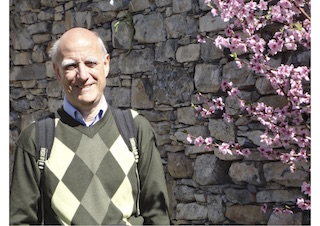Studiare
In questa sezione è possibile reperire le informazioni riguardanti l'organizzazione pratica del corso, lo svolgimento delle attività didattiche, le opportunità formative e i contatti utili durante tutto il percorso di studi, fino al conseguimento del titolo finale.
Calendario accademico
Il calendario accademico riporta le scadenze, gli adempimenti e i periodi rilevanti per la componente studentesca, personale docente e personale dell'Università. Sono inoltre indicate le festività e le chiusure ufficiali dell'Ateneo.
L’anno accademico inizia il 1° ottobre e termina il 30 settembre dell'anno successivo.
Calendario didattico
Il calendario didattico indica i periodi di svolgimento delle attività formative, di sessioni d'esami, di laurea e di chiusura per le festività.
| Periodo | Dal | Al |
|---|---|---|
| Sem. IA | 28-set-2015 | 8-nov-2015 |
| Sem. IB | 9-nov-2015 | 17-gen-2016 |
| Sem. IIA | 22-feb-2016 | 24-apr-2016 |
| Sem. IIB | 25-apr-2016 | 5-giu-2016 |
| Sessione | Dal | Al |
|---|---|---|
| Sessione Estiva | 6-giu-2016 | 31-lug-2016 |
| Sessione Autunnale | 1-set-2016 | 30-set-2016 |
| Sessione Invernale | 23-gen-2017 | 25-feb-2017 |
| Sessione | Dal | Al |
|---|---|---|
| Sesione Estiva | 8-lug-2016 | 15-lug-2016 |
| Sessione Autunnale (Solo Scienze del Serv. Sociale: Ven. 04/11/2016) | 21-nov-2016 | 26-nov-2016 |
| Sessione Invernale | 3-apr-2017 | 8-apr-2017 |
| Periodo | Dal | Al |
|---|---|---|
| Festa di Ognissanti | 1-nov-2015 | 1-nov-2015 |
| Festa dell'Immacolata | 8-dic-2015 | 8-dic-2015 |
| Vacanze Natalizie | 23-dic-2015 | 6-gen-2016 |
| Vacanze Pasquali | 24-mar-2016 | 29-mar-2016 |
| Festa della Liberazione | 25-apr-2016 | 25-apr-2016 |
| Festa dei Lavoratori | 1-mag-2016 | 1-mag-2016 |
| Festa del S. Patrono S. Zeno | 21-mag-2016 | 21-mag-2016 |
| Festa della Repubblica | 2-giu-2016 | 2-giu-2016 |
| Vacanze Estive | 8-ago-2016 | 15-ago-2016 |
Calendario esami
Gli appelli d'esame sono gestiti dalla Unità Operativa Segreteria Corsi di Studio Scienze Umane.
Per consultazione e iscrizione agli appelli d'esame visita il sistema ESSE3.
Per problemi inerenti allo smarrimento della password di accesso ai servizi on-line si prega di rivolgersi al supporto informatico della Scuola o al servizio recupero credenziali
Per dubbi o domande leggi le risposte alle domande più frequenti F.A.Q. Iscrizione Esami
Docenti
 alex.arcozzi@univr.it
alex.arcozzi@univr.it

Avezzu' Guido
 guido.avezzu@univr.it
guido.avezzu@univr.it
 augusto.barbi@univr.it
augusto.barbi@univr.it
 alberto.cavarzere@univr.it
alberto.cavarzere@univr.it

Chiecchi Giuseppe
 giuseppe.chiecchi@univr.it
giuseppe.chiecchi@univr.it
 +39 045802 8117
+39 045802 8117

Mastrocinque Attilio
 attilio.mastrocinque@univr.it
attilio.mastrocinque@univr.it
 +39 045802 8386
+39 045802 8386
 linda.napolitano@univr.it
linda.napolitano@univr.it
 carlotta.salettisalza@univr.it
carlotta.salettisalza@univr.it
 giorgia.totola@univr.it
giorgia.totola@univr.it
 ivan.valbusa@univr.it
ivan.valbusa@univr.it
 gianmaria.varanini@univr.it
gianmaria.varanini@univr.it
Piano Didattico
Il piano didattico è l'elenco degli insegnamenti e delle altre attività formative che devono essere sostenute nel corso della propria carriera universitaria.
Selezionare il piano didattico in base all'anno accademico di iscrizione.
1° Anno
| Insegnamenti | Crediti | TAF | SSD |
|---|
2° Anno Attivato nell'A.A. 2016/2017
| Insegnamenti | Crediti | TAF | SSD |
|---|
Un insegnamento a scelta Uno o due insegnamenti a scelta per un totale di 12 cfuUn insegnamento a sceltaUn insegnamento a scelta3° Anno Attivato nell'A.A. 2017/2018
| Insegnamenti | Crediti | TAF | SSD |
|---|
Da due a quattro insegnamenti a scelta per un totale di 24 cfuUno o due insegnamenti a scelta per un totale di 12 cfu| Insegnamenti | Crediti | TAF | SSD |
|---|
| Insegnamenti | Crediti | TAF | SSD |
|---|
Un insegnamento a scelta Uno o due insegnamenti a scelta per un totale di 12 cfuUn insegnamento a sceltaUn insegnamento a scelta| Insegnamenti | Crediti | TAF | SSD |
|---|
Da due a quattro insegnamenti a scelta per un totale di 24 cfuUno o due insegnamenti a scelta per un totale di 12 cfu| Insegnamenti | Crediti | TAF | SSD |
|---|
Legenda | Tipo Attività Formativa (TAF)
TAF (Tipologia Attività Formativa) Tutti gli insegnamenti e le attività sono classificate in diversi tipi di attività formativa, indicati da una lettera.
Sociologia generale (p) (2016/2017)
Obiettivi formativi
Il corso intende illustrare alcune tra le principali linee d'indagine teorica della sociologia durkhiemiana.
Programma
Dopo aver introdotto i temi principali dell’opera di É Durkheim, il corso si concentrerà su due dei più originali innovatori di questa tradizione di pensiero, ovvero Erving Goffman e Pierre Bourdieu. Di Goffman saranno discussi i lavori sui processi di costruzione sociale dell’individualità e quelli dedicati all’ordine rituale dell’interazione. Di Bourdieu si prenderanno invece in considerazione le analisi riguardanti i temi dell’habitus, dei campi, delle diverse forme di capitale e della violenza simbolica.
PREREQUISITI:
La comprensione degli argomenti trattati a lezione non necessita di specifiche conoscenze pregresse fatte salve alcune nozioni generali di storia della filosofia moderna e contemporanea.
CONTENUTI:
Durkhiem
Che cos'è la sociologia? La risposta di Durkheim;
le sanzioni morali e sanzioni naturali;
la natura coercitiva dei fatti sociali e il ruolo dell'emozioni in rapporto alla solidarietà sociale;
società civile, Stato e solidarietà sociale;
religione, ritualità e solidarietà sociale.
Goffman
l'individualità come fatto sociale;
la costruzione rituale dell'individualità: i giochi di faccia;
i linguaggi rituali della deferenza e del contegno come forme di costruzione sociale del sé;
linguaggi rituali e costruzione sociale della realtà;
l'ordine dell'interazione come ordine sociale sui generis.
Bourdieu
il dilemma oggettivismo/soggettivismo;
l'interiorizzazione del sociale: l'habitus;
l'esteriorizzazione del sociale: i campi;
le forme del capitale: cultura, economia, società e simboli;
ordine sociale, ingiustizie e violenza simbolica.
METODOLOGIA DIDATTICA
Il corso si svolgerà tramite una serie di lezioni frontali tese ad approfondire i testi d'esame, a mostrarne connessioni e differenze, ad indicare le questioni problematiche risolte e quelle invece lasciate aperte dai diversi apparati concettuali che li animano. Durante il corso, saranno previsti specifici momenti di discussione e confronto cui gli studenti saranno chiamati a partecipare attivamente.
TESTI D'ESAME
Durkheim É. (1895/1996). Le regole del metodo sociologico. Sociologia e Filosofia, Roma: Edizioni di Comunità [SOLO pp. 23-57 e pp. 165-206].
Durkheim É. (1912/2005). Le forme elementari della vita religiosa. Roma: Meltemi [SOLO pp. 243-297].
Durkheim É. (1973). Lezioni di sociologia. Milano: Etas [SOLO pp. 91-100].
Goffman E. (1959/1997). La vita quotidiana come rappresentazione. Bologna Il Mulino [SOLO pp. 95-164]
Goffman E. (1967/1988). Il rituale dell’interazione. Bologna: Il Mulino [SOLO pp. 7-122].
Goffman E. (1998). L’ordine dell’interazione, Roma: Armando.
Bourdieu P. (1998). Meditazioni pascaliane. Milano: Feltrinelli [SOLO pp. 135-216]
Bourdieu (2002). Campo del potere e campo intellettuale. Roma: Manifestolibri [SOLO pp. 51-82].
Bourdieu, P. (1986). The forms of capital. In J. Richardson, (ed.) Handbook of Theory and Research for the Sociology of Education. New York: Greenwood.
Bourdieu P., Wacquant L. J. D. (1992). Risposte. Per un’antropologia riflessiva. Torino: Bollati Boringhieri [SOLO pp. 66-135].
Modalità d'esame
L'esame si svolgerà in forma scritta. Lo studente sarà chiamato, nell'arco di due ore, a rispondere a 4 domande aperte inerenti il programma d'esame. Nello specifico, i quesiti saranno organizzati come segue: i primi tre, indirizzati a valutare la preparazione dei candidati, verteranno su temi presenti nei testi e ampiamente discussi a lezione; il quarto quesito mirerà invece a valutare l'autonoma capacità di analisi critica dei candidati e richiederà agli studenti di elaborare una riflessione personale sugli argomenti del corso (un confronto, un commento, un'esemplificazione, ecc.).
I criteri di valutazione impiegati saranno:
- Il grado di comprensione dell'oggetto della disciplina.
- Il grado di comprensione dei singoli concetti.
- La correttezza e la chiarezza espositiva dei problemi teorici.
- La padronanza del lessico disciplinare.
- La capacità di collegare gli argomenti.
- La capacità di indicare corrette ed efficaci esemplificazioni empiriche dei concetti teorici trattati.
Tipologia di Attività formativa D e F
Insegnamenti non ancora inseriti
Prospettive
Avvisi degli insegnamenti e del corso di studio
Per la comunità studentesca
Se sei già iscritta/o a un corso di studio, puoi consultare tutti gli avvisi relativi al tuo corso di studi nella tua area riservata MyUnivr.
In questo portale potrai visualizzare informazioni, risorse e servizi utili che riguardano la tua carriera universitaria (libretto online, gestione della carriera Esse3, corsi e-learning, email istituzionale, modulistica di segreteria, procedure amministrative, ecc.).
Entra in MyUnivr con le tue credenziali GIA: solo così potrai ricevere notifica di tutti gli avvisi dei tuoi docenti e della tua segreteria via mail e a breve anche tramite l'app Univr.
Tutorato per gli studenti
Gli iscritti al CdS in Filosofia possono rivolgersi al personale docente docente nell'orario di ricevimento per parlare delle eventuali difficoltà di cui fanno esperienza nel cammino formativo, nell’organizzazione del piano didattico, nella preparazione degli esami e in tutte le altre situazioni in cui può essere utile farsi aiutare nelle proprie scelte o ricevere un consiglio da persone consapevoli dei vari dettagli della vita accademica, dei processi e dell’architettura del CdS.
I docenti indicati come tutor del corso di laurea in Filosofia sono:
- prof. Federico Leoni;
- prof. Davide Poggi;
- prof.ssa Ilaria Possenti.
Nel quadro del programma di TUTORATO, il Dipartimento di Scienze Umane ha inoltre deciso di utilizzare l’esperienza di alcuni iscritti al Corso di Laurea Magistrale in Scienze Filosofiche per offrire un supporto che sia il più vicino possibile a chi frequenta il CdS triennale, sulla base della loro diretta esperienza.
Tali Tutor studenteschi forniranno un servizio di orientamento, sia in ingresso (vòlto a favorire un migliore inserimento nei Corsi di Studio, ovviando alle difficoltà e agli ostacoli che il passaggio dalla Scuola Superiore all’Università inevitabilmente comporta), sia in itinere, così da offrire un servizio di sostegno che sappia adeguatamente interpretare e rispondere alle esigenze di formazione e professionalizzazione, nonché alla sensibilità di chi frequenta i CdS filosofici.
Tra i compiti e le attività previste vi sono:
- Sostegno nella compilazione dei piani didattici, consulenza nella risoluzione di problemi amministrativi (reperimento informazioni sul sito web di Ateneo);
- Individuazione e suggerimento di Uffici e Responsabili competenti in relazione alle questioni segnalate, etc.;
- Aiuto per una migliore e più agile gestione del proprio iter formativo (supporto in merito all’accesso e alla fruizione della didattica on-line attraverso gli strumenti messi a disposizione dall’Ateneo);
- Orientamento delle/degli studenti (inclusa la scelta del docente per la tesi) in vista della prova finale di laurea;
- Svolgere attività di orientamento delle future matricole (su appuntamento via Zoom) coordinata dall’Ufficio Orientamento, anche tramite incontri nei mesi di settembre e ottobre;
- Gestione delle pagine social dedicate alle/agli studenti;
- Tutorial a distanza per supporto metodo di studio/tesi;
- Orientamento della/o studente all’uso del supporto prodotto dal sistema bibliotecario di Ateneo e aiuto alle/ai laureandi per reperire le fonti bibliografiche in caso consultazione materiale bibliografico non disponibile on-line;
- Indagine per la rilevazione di difficoltà dovute all'emergenza in corso;
- Tutorial per il sito del CdS di riferimento;
- Diffusione/pubblicizzazione di comunicazioni/informazioni di maggior importanza/utilità relativamente al CdS e alle sue attività/iniziative (bandi di tutorato/bandi di internazionalizzazione/etc.).
I Tutor studenteschi, tramite la casella di posta elettronica istituzionale, cercheranno di raggiungere le matricole per organizzare insieme una serie di colloqui informali e programmare eventuali iniziative sotto la supervisione dei Tutor accademici.
Per l'a.a. 2023-2024 sono stati nominate come Tutor per il CdS in Filosofia
- Cristian Meneghetti, cristian.meneghetti@studenti.univr.it disponibilità ricevimento: il mercoledì dalle 17.00 alle 19.00
- Michela Marcomini, michela.marcomini@studenti.univr.it disponibilità ricevimento: il giovedì dalle 15.00 alle 16.00
I ricevimenti si terranno in presenza previo appuntamento via e-mail presso la Sala Seminari 2, secondo piano del Palazzo di Lettere.
Eventuali variazioni di giorno e/o orario saranno comunicate con il dovuto anticipo mediante avvisi sulla pagina web di Ateneo.
Esercitazioni Linguistiche CLA
Gestione carriere
Guide operative per lo studente
In questa pagina lo studente potrà trovare delle guide operative, utili al completamento del proprio percorso universitario, che vanno ad integrare quanto già indicato nei Regolamenti didattici del CdS.
1- Qui si possono reperire indicazioni in merito ai riconoscimenti di carriera, ai crediti a libera scelta per lo studente e alle certificazioni linguistiche per gli studenti iscritti ai CdS afferenti al Dipartimento di Scienze Umane a partire dalla coorte 2022 (le indicazioni contenute nella Guida entrano in vigore dal 29 marzo 2023 e sono retroattive solo se a favore dello studente);
2 - Qui si possono reperire indicazioni in merito ai riconoscimenti di carriera, ai crediti a libera scelta per lo studente e alle certificazioni linguistiche per gli studenti iscritti ai CdS afferenti al Dipartimento di Scienze Umane a partire dalla coorte 2014 (le indicazioni contenute nella Guida entrano in vigore dal 29 aprile 2020 e sono retroattive solo se a favore dello studente);
3 - Qui si possono reperire indicazioni in merito al conseguimento dei crediti a libera scelta (Crediti D e F) per gli studenti iscritti ai i CdS afferenti al Dipartimento di Scienze Umane fino alla coorte 2013 (le indicazioni contenute nella Guida entrano in vigore dal 23 febbraio 2011 e sono retroattive solo se a favore dello studente).
Documenti
| Titolo | Info File |
|---|---|
|
|
pdf, it, 325 KB, 02/05/23 |
|
|
pdf, it, 212 KB, 02/05/23 |
|
|
pdf, it, 131 KB, 02/05/23 |
Prova Finale
Per conseguire la laurea in Filosofia, la/lo studente dovrà superare una prova finale. Essa potrà avvenire dopo almeno venti giorni dal superamento delle prove di valutazione relative a tutti i corsi di insegnamento e a tutte le attività formative, così come previsto dal proprio piano di studi.
La prova finale, cui sono attribuiti 6 CFU, consiste in un elaborato scritto volto ad approfondire una tematica concordata colla/col relatrice/relatore. La tematica dell’elaborato dovrà essere inerente al curriculum della/o candidata/o. La lunghezza dell’elaborato dovrà essere compresa tra venti e trenta cartelle. La/lo studente dovrà avvalersi della supervisione della/o relatrice/relatore, che può essere qualunque docente appartenente all’Ateneo, incluse/i le/i docenti a contratto. La/lo studente dovrà aver superato almeno un esame afferente al settore scientifico-disciplinare di appartenenza della/o relatrice/relatore. Non è prevista la figura della/o correlatrice/correlatore.
L’elaborato potrà essere redatto anche in lingua diversa dall’italiano, previa approvazione della/o relatrice/relatore e del Collegio Didattico, ma la discussione dovrà comunque essere condotta in italiano. La/lo studente potrà ritirarsi dall’esame finale fino al momento di essere congedato dal Presidente della Commissione per dare corso alla decisione di voto. Il Regolamento Didattico di Ateneo stabilisce le procedure alle quali attenersi nel caso in cui la/il candidata/o non consegua il punteggio minimo richiesto.
La discussione della prova finale avviene in un periodo di tempo che precederà la proclamazione. Il giorno e l’orario preciso della discussione verranno comunicati alla/o laureanda/o dal/la propria/o relatrice/relatore.
La discussione sarà effettuata con una Commissione Istruttoria composta dal/la relatrice/relatore della/o laureanda/o ed un/a altra/o docente, e potrà avvenire in modalità telematica nel caso del protrarsi dell’emergenza da SARS-CoV-2. Superata la discussione della tesi con la Commissione Istruttoria, la proclamazione con comunicazione del voto di laurea avverrà nel periodo indicato nel calendario didattico. Il giorno, l’ora e le modalità di proclamazione saranno resi noti con la pubblicazione del Calendario Lauree commissioni Triennali.
La commissione dispone di centodieci punti; il voto minimo per il superamento dell'esame è di 66/110, mentre il voto di partenza è dato dalla media ponderata dei voti degli esami. Il voto viene assegnato dalla commissione in assenza della/o candidata/o e di ogni altro estraneo. Nell’assegnazione del voto alla prova finale, la commissione, valutato anche il curriculum della/o candidata/o, si atterrà ai seguenti criteri, attribuendo:
- fino a cinque punti per la dissertazione;
- in rispetto, e ampliamento, di quanto previsto dal Regolamento di Ateneo per la mobilità studentesca internazionale, il Collegio Didattico di Filosofia incentiva l’internazionalizzazione assegnando 2 (due) punti su 110 aggiuntivi alle/agli studenti che abbiano conseguito almeno 2 CFU all’estero;
- un punto per il compimento in corso degli studi;
- un punto se la/lo studente ha proseguito al II anno nel corso di studio avendo acquisito almeno 40 CFU al I anno.
Nel caso in cui la/il candidata/o abbia ottenuto il massimo dei voti, la commissione può concedere, all’unanimità, la distinzione della lode.
Documenti
| Titolo | Info File |
|---|---|
|
|
pdf, it, 99 KB, 13/10/23 |
|
|
pdf, it, 101 KB, 10/04/24 |






























